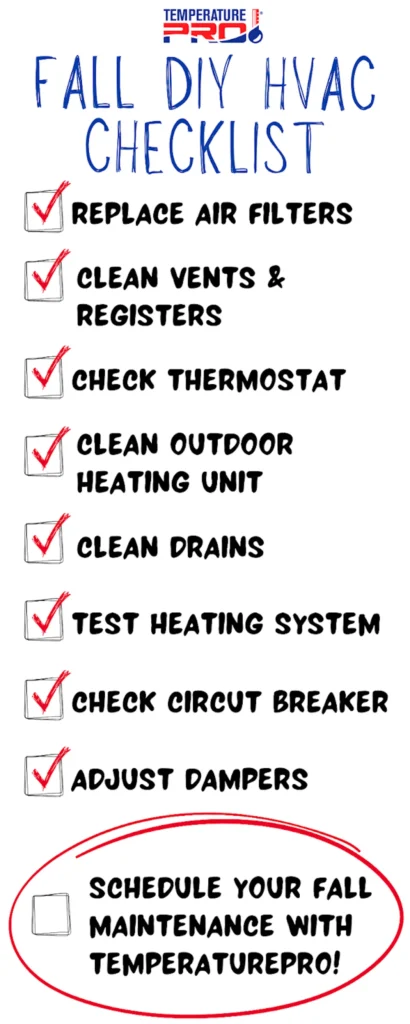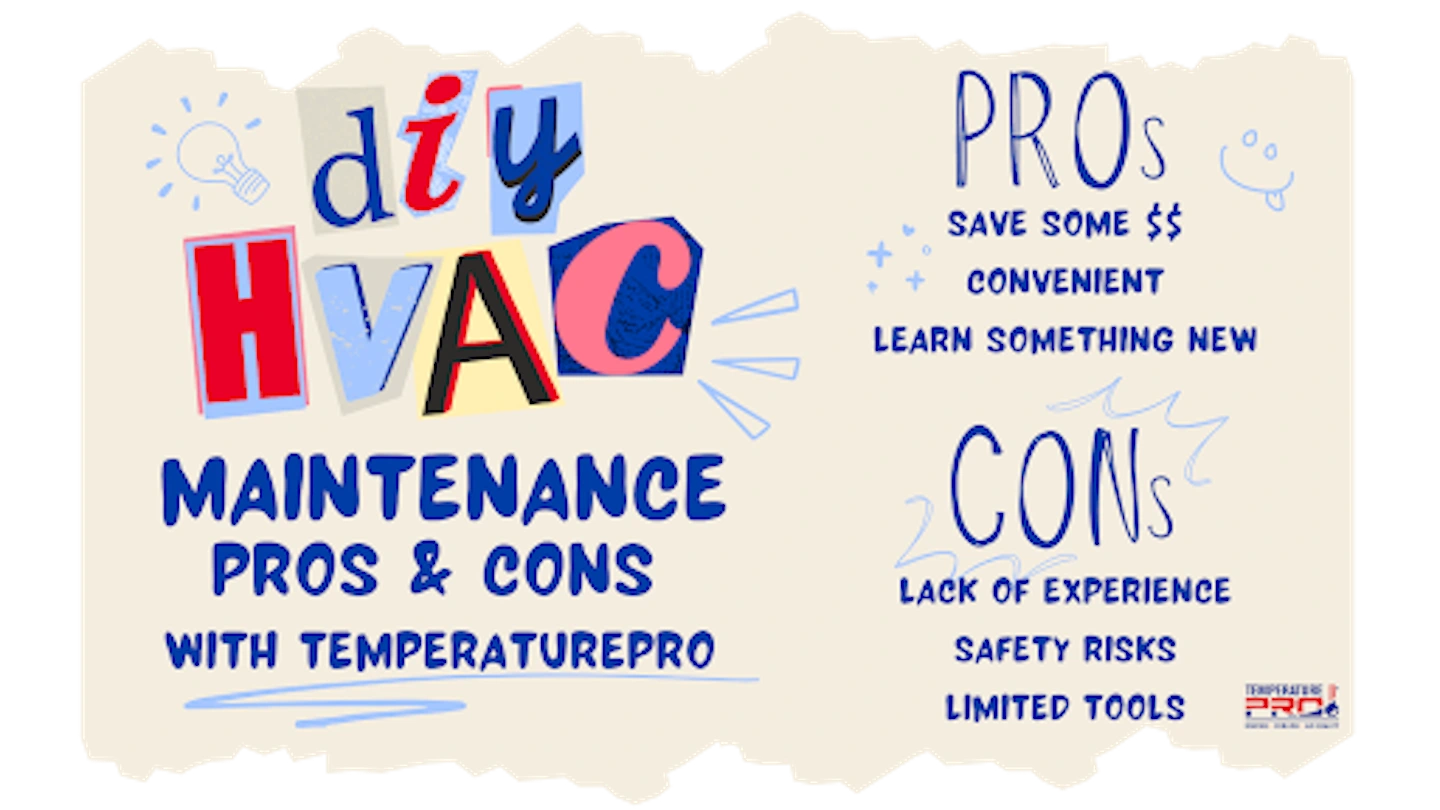The leaves are changing. The weather is finally cooling down. The calendar is filled with all sorts of fall activities, from hay rides to sports, schools, holidays, and more. It’s time to think about what to cook for Thanksgiving, Halloween costumes, and raking leaves in the yard. It’s also time to start thinking about your HVAC system. Proper maintenance is crucial for ensuring your system runs efficiently and reliably throughout the fall and winter months. While some homeowners may consider taking on the task themselves, it’s important to weigh the pros and cons of DIY maintenance versus professional HVAC services. In this comprehensive guide, we’ll delve into the benefits and drawbacks of both approaches, highlight safety concerns, and explain the value of professional services with real-life examples and testimonials.
Pros and Cons of DIY HVAC Maintenance
At TemperaturePro, we will always find a way to get your home heating system maintenance fixed as efficiently as possible. If this means the simple fix for you is a DIY solution, then we are happy to explain. However, we are professionally trained to spot any small current issues that may wind up becoming expensive projects down the line, therefore saving you money in the long run!
Pros of DIY HVAC Maintenance
- Cost Savings: The most apparent benefit of DIY HVAC maintenance is saving money. By handling basic tasks yourself, you can avoid the service fees charged by professionals.
- Convenience: You can perform maintenance at your own pace and schedule, without needing to coordinate with a professional’s availability.
- Learning Opportunity: Performing maintenance yourself provides an opportunity to learn more about your HVAC system, which can be empowering and useful for minor repairs.
Cons of DIY HVAC Maintenance
- Lack of Expertise: Without professional training, you may miss critical issues that could lead to costly repairs down the line. HVAC systems are complex, and a superficial understanding might not be enough to ensure everything is functioning correctly.
- Safety Risks: Handling HVAC equipment involves dealing with electricity, refrigerants, and moving parts, all of which pose significant safety risks if not handled properly.
- Limited Tools and Equipment: Professionals have specialized tools and equipment that the average homeowner likely does not possess, making DIY difficult to perform thorough maintenance.
A Comprehensive DIY Maintenance Checklist To Get Your Home Ready For Fall
Homeowners can perform several simple and low-risk HVAC maintenance tasks to help ensure their systems run smoothly. Here is a list of DIY tasks that are safe for most people to handle:

- Replace Air Filters: Regularly changing the air filter is one of the easiest and most effective ways to maintain your HVAC system. Most filters should be replaced every 1-3 months, depending on the type of filter and the level of dust and allergens in your home.
- Clean Vents and Registers: Dust and debris can accumulate on vents and registers, obstructing airflow and reducing system efficiency. Use a vacuum or a damp cloth to clean these areas regularly.
- Check the Thermostat: Ensure your thermostat is working correctly and set to the desired temperature. Replace batteries if necessary and consider upgrading to a programmable thermostat for better control over your home’s temperature.
- Clear the Area Around the Outdoor Unit: Keep the area around your outdoor unit free from debris, such as leaves, grass, and dirt. Make sure there are at least two feet of clearance around the unit to ensure proper airflow.
- Inspect and Clean the Condensate Drain: The condensate drain can become clogged with algae and debris, leading to water damage and reduced efficiency. If it is easily accessible, check the drain periodically and use a mixture of water and vinegar to clean it if necessary.
- Test the System: Before the start of each heating or cooling season, turn on your HVAC system and let it run for a short period. Listen for any unusual noises and check that it is providing the expected level of heating or cooling.
- Check the Circuit Breaker: If your HVAC system stops working, check the circuit breaker to ensure it hasn’t tripped. Reset it if necessary, but if it trips again, call a professional to inspect the system.
- Adjust the Dampers: If your home has a zoning system with dampers, ensure they are correctly adjusted for the season. This helps direct airflow efficiently throughout your home.
By performing these simple maintenance tasks, homeowners can help keep their HVAC systems running smoothly and efficiently. However, for more complex tasks or when in doubt, it is always best to call a professional HVAC technician such as TemperaturePro to ensure safety and proper system performance.
Examples of Issues Only a Professional Can Spot
We completely understand the desire to be able to fix problems in and around your home in a quick, efficient manner, and that this might mean dipping your toes into the DIY maintenance world. However, there are many different issues that professionals are trained to spot that might be missed by the average homeowner.
- Spotting HVAC Refrigerant Leaks: Detecting refrigerant leaks requires specialized equipment and knowledge. Our trained techs can locate and repair leaks, ensuring your system maintains proper refrigerant levels and operates efficiently.
- Possible HVAC Electrical Issues Requires Professional Diagnosis: Faulty wiring or electrical components can lead to system failures or pose safety risks. Professionals can identify and repair these issues, preventing potential hazards and ensuring your system operates reliably.
- Discovering HVAC Airflow Problems: Issues such as blocked ducts, dirty filters, or malfunctioning fans can restrict airflow and reduce system efficiency. Professionals can diagnose and address these problems, ensuring optimal airflow and system performance.
- Diagnosing Thermostat Malfunctions: A malfunctioning thermostat can cause your HVAC system to operate inefficiently or not at all. Professionals can calibrate and repair thermostats, ensuring accurate temperature control and efficient operation.
Safety Concerns with DIY HVAC Maintenance
Our number one priority at TemperaturePro is you, our customer. This includes your safety and your health. Our relationship with our clients is built on trust and transparency, and we want to provide the best service possible that is beneficial for your home, but also for you. If you plan on doing DIY HVAC Maintenance, please consider the below safety concerns.
Electrical Hazards
HVAC systems involve intricate electrical components. If you lack the proper knowledge and tools, you risk electrical shock or even starting a fire. This is particularly true when dealing with capacitors and wiring.
Refrigerant Handling
Refrigerants used in HVAC systems can be hazardous if mishandled. Inhaling refrigerant gasses can lead to health issues, and improper handling can cause environmental harm. Our TemperaturePro Techs are professionally trained and certified to handle these substances safely.
Another thing to note: EPA Certifications are required in order to handle refrigerants in HVAC systems. If done by a non-certified person, this could result in hefty fines. TemperaturePro is certified and trained to replace the refrigerant in your system, meaning it’ll be done right the first time.
Mechanical Risks
Moving parts within the HVAC system, such as fans and belts, can cause injuries if not handled with care. There is also the risk of causing further damage to the system, leading to more expensive repairs.
The Value of Professional HVAC Services
We cannot overstate the importance of professional HVAC services when it comes to inspections, repairs, installs and preventative maintenance. With our extensive knowledge and background in this industry, we have learned all the tips and tricks in the book to keep your system running as efficiently as possible. While some small repairs can certainly be fixed by homeowners and the average joe, the below information is highly recommended to be left to the TemperaturePro Professionals.
HVAC Professionals Provide Thorough Inspections
Our TemperaturePro HVAC technicians conduct comprehensive inspections that go beyond surface-level checks. They can identify and address issues such as refrigerant leaks, faulty wiring, and worn-out components before they lead to system failure. We are trained to spot these issues early and will be able to relate them to other problems that may arise in the future as well.
Highly-Skilled HVAC Techs Perform Efficient Repairs
Professionals are equipped with the tools and expertise to perform repairs efficiently and effectively. TemperaturePro Techs can quickly diagnose problems and implement solutions that ensure your HVAC system operates at peak performance. This means saving you time and money!
Trained HVAC Professionals Can Perform Preventative Maintenance
Routine professional maintenance can prevent costly breakdowns and extend the lifespan of your HVAC system. Technicians can perform tasks such as cleaning and adjusting components, lubricating moving parts, and testing system performance to prevent issues before they occur.
This is where our ProPlan Membership comes into play for many homeowners. We keep track of your bi-annual maintenance visits and remind you when it’s time to schedule. With priority scheduling for our members, you get the best time that works with your schedule. Plus, some serious discounts if something needs to be repaired. Check it out today and take one more thing off your to-do list!
Regular HVAC Maintenance Increases Energy Efficiency
A well-maintained HVAC system operates more efficiently, reducing energy consumption and lowering your utility bills. Our TemperaturePro Professionals can optimize your system’s performance, ensuring it heats and cools your home effectively without wasting energy.
Research and Reputable Sources
For further reading and to validate the importance of professional HVAC maintenance, consider these reputable sources:
- Energy.gov: Home Heating Systems: Provides information on the various types of home heating systems and maintenance tips.
- EPA – Refrigerants: Offers guidelines on handling refrigerants and the importance of proper maintenance.
- ACCA – Air Conditioning Contractors of America: A leading association that offers resources and best practices for HVAC maintenance and repair.
DIY Tips for HVAC Maintenance VS. A Professional: Long Story Short
When it comes to HVAC maintenance, the choice between DIY and professional services depends on your expertise, tools, and willingness to take risks. While DIY maintenance can save money and be convenient, it comes with significant safety concerns and the potential for missed issues. On the other hand, professional HVAC services provide comprehensive inspections, efficient repairs, preventative maintenance, and optimized system performance, ultimately saving you money and stress in the long run.
By understanding the pros and cons of each approach and recognizing the value of professional expertise, you can make an informed decision that ensures your HVAC system operates reliably and efficiently throughout the fall and winter seasons.
Investing in professional HVAC maintenance not only safeguards your home and health but also contributes to energy savings and prolongs the lifespan of your system. As the saying goes, “An ounce of prevention is worth a pound of cure.” So, this fall, consider scheduling a professional HVAC maintenance service to keep your home comfortable and your system running smoothly. Let’s make sure everything is working properly: Find Your Local TemperaturePro Today!






